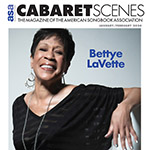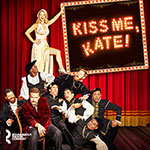Judy Collins’ Love Letter to Stephen Sondheim
March 22, 2018
By Pamela S.K. Glasner for Cabaret Scenes
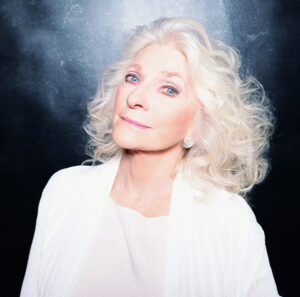
Photo: JC Lainez
For those of us who came of age in the 1960s and early ’70s, it was a time of dichotomies: the originality and influence of our music against the backdrop of the Vietnam war; songs and poems preaching tolerance and inclusion being performed in cafés and stadiums across the country as vicious civil rights battles raged on; the sexual revolution; walking on the moon; Kent State; feminism; hippies; Watergate; psychedelic drugs; Bloody Sunday; and flower children … To quote Charles Dickens, “It was the best of times, it was the worst of times.” And yet, for all that, it was a magical time… because, out of all that incongruity and turbulence, from San Francisco to Broadway, from Liverpool to Greenwich Village, came some of the finest music this world has ever known.
One of the most extraordinary artists that era produced was Judith Marjorie Collins. It was my great privilege to speak with Judy this week, and I have to say: She is as gracious a lady as I always imagined she would be.
The first question I had to ask, of course, was what drew her to a particular song or a style because, over the years, her musical choices have been diverse, to say the least. Her answer was, quite simply, “I have to love it … and then I make it into a Judy Collins song.” Okay, then, what did she mean by “make it a July Collins song”? She laughed and said, “I sing it — that’s the only secret!” Then she elaborated: “If it gets that far, then it probably means I should be performing it. So I put it in my show and see what happens.”
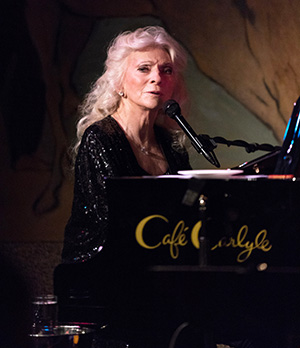
Photo: David Andrako
Based on her world-wide enduring success over half a century, and her future schedule, which, in most cases, I dare say, would intimidate even the heartiest of septuagenarians, what “happens” is thunderous applause and standing ovations. Her audiences unabashedly adore her!
Naturally, before I called Collins, I visited her website. Her schedule shows bookings, many of them back-to-back, all the way through August — and that’s just for now. I wanted to know what it was like, doing something she’s always loved, but doing it on such a grand scale. “It sounds glorious,” I said, “but it also sounds exhausting!” “Not at all,” she told me, “It’s what I do: I sing; I’m on tour; now I’m at the point where I am doing 150 performances a year. I’m out all the time, so I’m either recording or on the road — or writing books. I just published my 10th book — so I’m a busy girl!”
Ten! I’m an author, so I know what it takes to write and publish a book. I was so awed by that, I couldn’t help but exclaim, “Ten — wow — congratulations — that’s amazing!” She paused for a moment and then said, “Yeah — it IS amazing. But it’s not exhausting — it’s what I do, and I just do it.”
Like many of us, my earliest memory of Judy Collins is her exquisite rendition of Joni Mitchell’s “Both Sides Now.” Ms. Collins had never met Ms. Mitchell prior to hearing the song and, in fact, didn’t really ‘meet’ her at that point, either. Collins’ friend, Al Kooper (of Blood, Sweat & Tears fame), had phoned her and asked her to listen to a song, whereupon he put Joni Mitchell on the line. Mitchell sang “Both Sides Now” and Collins fell in love — as have many!
Collins loves singing songs written by others, as long as she feels some personal connection. If the song touches her, then she wants to sing it. If not, then it’s off her radar. It’s that simple. She doesn’t care about genre — all she cares about is whether or not it speaks to her — which is why her heterogeneous collection even includes hymns. Who could ever forget her unparalleled rendition of “Amazing Grace”?
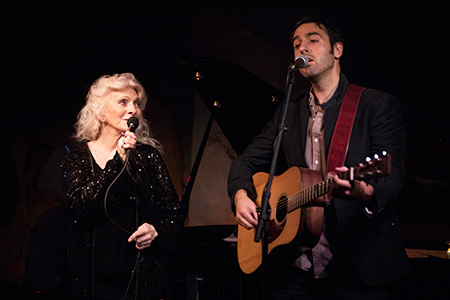
Photo: David Andrako
Released in 1970, Collins reprised the song at President Bill Clinton’s first inauguration in 1993, and I have to say: As far as I am concerned, there is no such thing as listening to “Amazing Grace” too many times. Singing any song and never, ever going off-key is no mean feat. Singing it a cappella and remaining pitch-perfect is nothing less than Herculean. The woman is incredible.
She also, by the way, sang Joni Mitchell’s “Chelsea Morning” for the Clintons, who reportedly named their daughter after Collins’ recording.
Ms. Collins compares choosing the songs she will sing to falling in love: You don’t really know why, it’s just chemistry … which brings us to the Sondheim songs she fell in love with, recorded on her album, A Love Letter to Sondheim, and which she be will performing at the Café Carlyle, beginning on March 27.
Stephen Sondheim is, of course, Broadway’s iconic wordsmith and composer with a bevy of world-renowned musicals that includes West Side Story [music by Leonard Bernstein], A Funny Thing Happened on the Way to the Forum, Sweeney Todd, Follies, A Little Night Music … the list just goes on.
The first Sondheim song Collins ever recorded was “Send in the Clowns” from the 1973 musical A Little Night Music. At that point, not only hadn’t she met the man, she’d never heard the song and she didn’t know a thing about the play. But a good friend of hers — Nancy Bacal, who also happened to be singer/songwriter Leonard Cohen’s best friend — sent her the album and, just like she did with “Both Sides Now,” Collins fell in love. She immediately phoned Hal Prince, A Little Night Music’s director, and informed him of her interest, at which point he told her that about 200 people had already recorded it. Collins’ reaction? “I don’t care!”
And it’s a good thing she didn’t because her version of the song, which was released in 1975 and spent 27 weeks on the Billboard Pop Singles chart, earned Sondheim his Song of the Year Grammy. To this day, 45 years and more than 40 million songs later, I still cannot think of any song more poignant or perfect.
Fast-forward four decades to A Love Letter to Sondheim, Judy’s very special tribute to the genius whose songs and plays she (along with many of us!) has adored for years. “I would say I’ve seen virtually all of his musicals.” In fact, except for Passion and Assassins, she has seen “pretty much everything else. And, of course, they are beautiful, astonishing productions — I just love his work.”
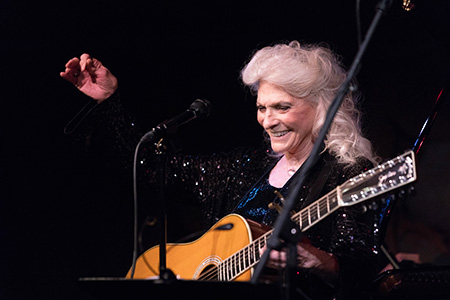
Photo: David Andrako
So much so, that the idea for this tribute has been brewing inside her for a quarter of a century. She adores the complexity of his songs, and gets to work with, as she put it, “the great Jonathan Tunick,” who is Sondheim’s Tony/Oscar/Emmy/Grammy Award-winning orchestrator and musical director of choice. “Tunick,” Collins told me, “has done [arranged] a lot of my Sondheim songs, including the ones on this orchestral album. You know, in the case of Sondheim, you’re working with his orchestration, because he does them all himself and they’re all brilliant.”
So – what can you expect as an audience member when you go to see a performance of A Love Letter to Sondheim? Well, if history is any predictor of the future, don’t expect Collins to limit her concert to ‘just’ Sondheim show tunes. What you can expect is to be charmed and swept away by the eclectic mix her fans have come to expect over the past fifty years.
When I asked Collins what her future plans are, she answered, simply, “To keep singing for the rest of my life!” I certainly hope so.
Performances will take place Tuesday – Saturday at 8:45 PM. Reservations can be made by phone at 212.744.1600 or online via Ticketweb. Café Carlyle is located in The Carlyle, A Rosewood Hotel (35 East 76th Street, at Madison Avenue).




